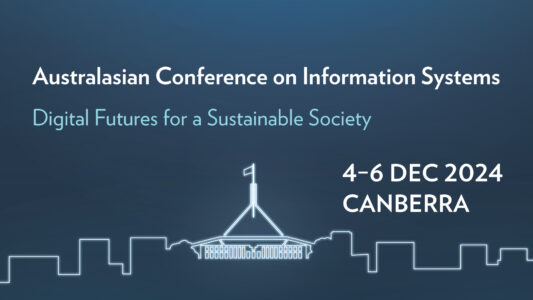The Australasian Conference on Information Systems (ACIS 2024) was hosted by the University of Canberra in Canberra, the capital of Australia, from 4 December to 6 December 2024. In its 35th year, the Australasian Conference on Information Systems is the premier conference on the Information Systems discipline in the Australasian region.
Digital Futures for a Sustainable Society
Building digital futures for a sustainable society involves utilizing technology to address environmental, social, and economic challenges while ensuring that the benefits are inclusive and equitable. As technology advances and organizations transform, the need to integrate sustainability principles into digital practices is even more critical. Technologies for the future need to be built according to regenerative designs to improve economic resilience, foster digital sovereignty, and achieve social equity.
By combining digital solutions with sustainable practices, societies can work towards a more resilient, effective, and inclusive future. It is crucial to prioritize ethical considerations, regenerative principles, data privacy, and security to ensure that the implementation of digital technologies aligns with sustainability principles.
The Australasian Conference on Information Systems (ACIS 2024) was hosted in Canberra, the capital of Australia, from 4 December to 6 December 2024. Canberra, which means “the meeting place” in the local Ngunnawal language, is one of the world’s most sustainable cities. Attendees from around the globe came together in Canberra to share research insights and perspectives about how digital technologies can promote sustainability and facilitate a resilient economy that works for the common good.
Submissions from 2024
Reactions of Social Media Users Toward Increasingly Being Exposed to Targeted Brand Advertising: A Southern Hemisphere Perspective, Nicholas Munro, Zane Davids, and Lisa F Seymour
Design and Implementation of Immersive Systems for Decision-Making, Ajay Mutreja, Gabrielle Peko, Johnny Chan, and David Sundaram
Designing an Intelligent Tutoring Chatbot for Declarative Process Modeling Education, Sabine Nagel, Anna Wolters, Dennis M. Riehle, and Patrick Delfmann
Towards a Procedural Model for Automatic Context-specific Task Identification based on Natural Language Documents in Business Process Management, Leonard Nake, Stephan Kühnel, and Stefan Sackmann
Integrating Sustainability Education into the Information Systems Curricula? Perspectives from Information Systems Academics in Australian Universities, Fatuma Namisango, Umera Imtinan, Florence Mwagwabi, Despoina Giannakaki, and Mostafa Hamadi
Understanding Perceived Review Helpfulness Through the Lens of Salience, Thuy Tien Nguyen, Arvind Tripathi, and Randy Wong
Business architecture methods: An initial review and mapping study, Eesha Oaj, Asif Gill, and Madhushi Bandara
Overcoming Data Scarcity: Strategic Data Manipulation in the Development of a Knowledge-Based System for Type 2 Diabetes Prediction, Adel Omar, Ghassan Beydoun, and Herbert Jelinek
Does AI video summary help? The effects of AI-generated video summary, Chenlu Ouyang and David Xu
An Ontology-based Framework to Enhance Carbon Reduction Assessment, Sagar Pandey, Ghassan Beydoun, Madhushi Bandara, Brad McCusker, and Charis Devalence
Responsible CIO Leadership: A Delphi Study on the Evolving Competencies, Roles and Responsibilities, and Relationships of Chief Information Officers in Australia, Mridul Pant, Christine Van Toorn, and Michael Cahalane
Estimating Gender Completeness in Wikipedia, Hrishi Patel, Tianwa Chen, Ivano Bongiovanni, and Gianluca Demartini
Reflections on undertaking information systems research inclusive of people with intellectual disability, Heidi Peart, Shanton Chang, Piers Gooding, Jennifer Davidson, and Jeannie Marie Paterson
An Explainable Artificial Intelligence Framework for Improving Semiconductor Manufacturing: A Design Science Research Approach, Itilekha Podder and Udo Bub
The Impact of Security Incidents on Employee Behaviour, Sunitha Prabhu and Monjur Ahmed
Preserving the Enggano Language: A Digital Dictionary Approach, Cokorda Pramartha, Gede Primahadi W. Rajeg, Mary Dalrymple, and I Wayan Arka
The Impact of Knowledge Acquisition, Knowledge Sharing, and Technology Acceptance Factors on Generative AI Adoption in Higher Education Institutions, Mamdouh Qahl and Amani Yahya
Online and Autonomous Teaching: A Case Study of Flexible Learning during and beyond the Pandemic, Sumaira Qureshi, Joanne Thandrayen, and Qishang Chua
Does automation empower? An analysis using Arendt’s conception of work, Kai Riemer and Sandra Peter
Prompting for Perks: Enhancing Generative-AI Enabled Job Crafting in Knowledge Work, Eva Ritz, Joël Mühlheim, Leonie Rebecca Freise, and Mahei Manhai Li
StandFram – A Method to Design and Build a Standards and Frameworks Knowledge Graph, Rosetta Romano, Blooma John, Marcus Jowsey, Simon Thompson, and Jayan Kurian
Sexbots and Rock&Roll: A Dialectical Inquiry into Digisexuality Between Progress and Regress, Zara Rubinsztein and Raffaele F Ciriello
Consense: Designing a Compassionate System Against Workplace Sexual Harassment in Australian Law Firms, Zara Rubinsztein, Phoebe Sharpe, Liam Charles Graham, Nian Li, and Raffaele F Ciriello
Exploring the Impact of Tailored Game Content on Ethical Decision-Making Competence in Cybersecurity, Bakhtiar Sadeghi, Deborah Richards, Paul Formosa, and Michael Hitchens
Intrusion of Generative AI in higher education and its impact on the educators’ well-being: A scoping review, Hala Sakr and Ahmed Imran


